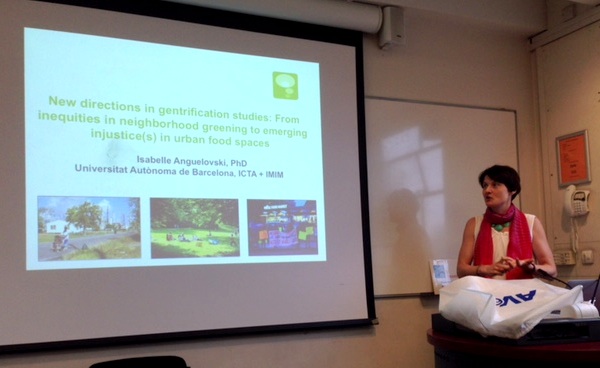It’s perhaps no surprise that an event on gentrification attracted a large and engaged audience at Birkbeck on the evening of Friday, 3 June. The term “gentrification” has its origins, after all, here in London, it being coined by the UCL sociologist Ruth Glass in her introduction to the 1964 book London: Aspects of Change. There are also few places were the impact of contemporary gentrification has been more pronounced – the forms of property speculation, community displacement and uneven economic development that characterize the urban phenomenon have long been defining elements of London life. Isabelle Anguelovski’s visit to Birkbeck encouraged both a global consideration of gentrification and an awareness of the potentially overlooked role that environmental justice movements and food spaces play within these larger urban processes. Anguelovksi is a senior researcher at the Institute for Environmental Science and Technology (ICTA) at the Autonomous University of Barcelona where she leads a number of major research initiatives, including the “Cities and Environmental Justice” and “GREENLULUS” projects. Her aptly titled Birkbeck talk, “New Directions in Gentrification Studies,” highlighted the inequalities and injustices produced by processes of urban “development” or “revitalization” in the diverse cities where her research has been conducted, contexts ranging from predominantly black and Hispanic neighbourhood of Jamaica Plain, Boston to marginalized informal settlement communities in Medellín, Columbia.
Food networks and environmental resources lie at the centre of Anguelovski’s case study research and her work uncovers the ways in which green-oriented neighbourhood “improvements” often fuel the very processes of gentrification that threaten the communities living within these areas. Her talk highlighted the manner in which the benign surface appearance of green, environmental or ecological development schemes can serve to mask the negative impact these projects may have on marginalized populations.
Case studies: The processes of gentrification
In the case of Jamaica Plain in Boston, the arrival of the organic Wholefoods Food Market has also involved the closing of the Hi-Lo Supermarket, not only an affordable source of Latino food staples, but also a focal point of the community. Meanwhile, improvements in park and leisure spaces have led to rising rents and the influx of wealthier residents. In Medellín, Columbia, the development of a 75 kilometre green belt around the city will also initiated the process of displacing the informal settlement communities that have long been using this land for farming and sustenance. To characterize these deceptively damaging new forms of gentrification, Anguelovski has coined the term GreenLULUs, an adaptation of an acronym (Locally Unwanted Land Uses) usually reserved for unwelcome urban spaces like landfills, prisons, and power plants. The troubling political paradox that emerges from Anguelovski’s insightful work is that the negative impact of green or ecological gentrification leaves environmental justice movements in an extremely difficult position – attempts to improve quality of life for poor or marginalized communities may well have the unintended consequence of raising property values, exasperating social inequalities and pushing out the very people these activist movements are attempting to help. If a solution to this paradox exists, Anguelovski suggests it must come in the form of alternative networks and resources that involve the community directly in their organizational and, perhaps most importantly, ownership structure.
Academic responses
The global complexities of green or food-based processes of gentrification were further explored by two excellent responses to Anguelovski’s talk. Dr. Daisy Tam, a prominent researcher of food culture in Asia visiting from the Hong Kong Baptist University, brought forward the particular ecological and food dynamics of the city of Hong Kong, where massive areas of farm land surrounding the city lay deliberately fallow in order to facilitate a change in regulations that will allow them to be used for property development.
Aaron Vansintjan, a PhD candidate here at Birkbeck and the recipient of the college’s Technologies of Sustainability doctoral scholarship, commented on the complexities and contradictions in urban politics and food culture he has witnessed during his first few months in London. Vansintjan, whose PhD project will study food networks and gentrification in Montreal and Hanoi, highlighted the difficult political position faced by young people within the city, a population that is often itself precarious and impoverished, while simultaneously serving as the first wave of gentrification in many areas of London.
The thought provoking talk and responses were followed by a number of insightful audience questions and comments. The paradoxes and political difficulties raised by Anguelovski’s work on green gentrification certainly resonate for students and researchers confronting a number of issues involving uneven economic development and community displacement within London and beyond. Clear parallels can be seen, for example, with “smart-city” and “creative city” initiatives. Whether these forms of green, technology, or culture-oriented urban development are designed to improve the social and economic life of the area residents, or to stimulate investment and demographic change, remains one of the key questions for contemporary gentrification studies.
Dr. Joel McKim is Lecturer in Media and Cultural Studies at Birkbeck and co-organizer of the Architecture, Space and Society Research Centre.
Isabelle Anguelovski’s talk was sponsored by the Department of Film Media and Cultural Studies, the Architecture, Space and Society Research Centre, BIRMAC (Birkbeck Interdisciplinary Research in Media and Culture), and the Birkbeck Food Group.




Leave a Reply